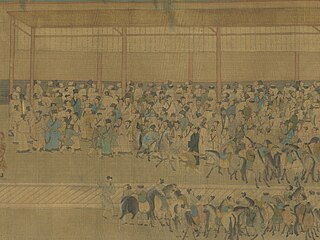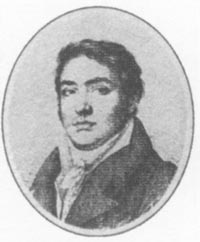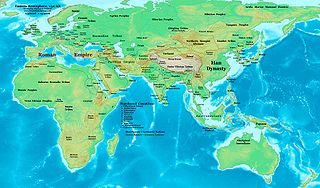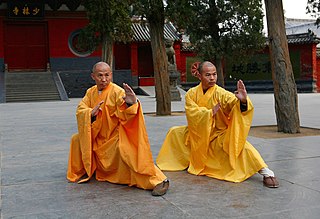Chinese classic texts or canonical texts refers to the Chinese texts which originated before the imperial unification by the Qin dynasty in 221 BC, particularly the "Four Books and Five Classics" of the Neo-Confucian tradition, themselves a customary abridgment of the "Thirteen Classics". All of these pre-Qin texts were written in classical Chinese. All three canons are collectively known as the classics.
Tonyukuk was the baga-tarkhan and adviser of four successive Göktürk khagans - Ilterish Qaghan, Qapaghan Qaghan, Inel Qaghan and Bilge Qaghan.

Chinese imperial examinations were a civil service examination system in Imperial China to select candidates for the state bureaucracy. Although there were imperial exams as early as the Han dynasty, the system became widely utilized as the major path to office only in the mid-Tang dynasty, and remained so until its abolition in 1905. Since the exams were based on knowledge of the classics and literary style, not technical expertise, successful candidates were generalists who shared a common language and culture, one shared even by those who failed. This common culture helped to unify the empire and the ideal of achievement by merit gave legitimacy to imperial rule, while leaving clear problems resulting from a systemic lack of technical and practical expertise.

The Tungusic languages form a language family spoken in Eastern Siberia and Manchuria by Tungusic peoples. Many Tungusic languages are endangered, and the long-term future of the family is uncertain. There are approximately 75,000 native speakers of the dozen living languages of the Tungusic language family. Some linguists consider Tungusic to be part of the controversial Altaic language family, along with Turkic, Mongolic, and sometimes Koreanic and Japonic.

The baccalauréat, often known in France colloquially as bac, is an academic qualification that French students are required to take to graduate high school. Introduced by Napoleon I in 1808, it is the main diploma that is required to pursue university studies.

Jean-Pierre Abel-Rémusat was a French sinologist best known as the first Chair of Sinology at the Collège de France. Rémusat studied medicine as a young man, but his discovery of a Chinese herbal treatise enamored him with the Chinese language, and he spent five years teaching himself to read it. After publishing several well-received articles on Chinese topics, a chair in Chinese was created at the Collège de France in 1814 and Rémusat was placed in it.

Hankuk University of Foreign Studies is a private research university based in Seoul, Republic of Korea. The university was founded in 1954 to promote foreign language education in post-war Korea. The university is located in Seoul and Yongin. The university has 60 departments and offers 53 different language courses. The name of the university is derived from the romanization of the Korean word Hankuk which means Korea. The university is considered one of the best private higher education institutions in South Korea, especially on foreign language and social science. It has a graduate school of interpretation and translation.

Sino-Roman relations comprised the mostly indirect contact, flow of trade goods, information, and occasional travellers between the Roman Empire and Han Empire of China, as well as between the later Eastern Roman Empire and various Chinese dynasties. These empires inched progressively closer in the course of the Roman expansion into the ancient Near East and simultaneous Han Chinese military incursions into Central Asia. Mutual awareness remained low, and firm knowledge about each other was limited. Only a few attempts at direct contact are known from records. Intermediate empires such as the Parthians and Kushans, seeking to maintain lucrative control over the silk trade, inhibited direct contact between these two Eurasian powers. In 97 AD, the Chinese general Ban Chao tried to send his envoy Gan Ying to Rome, but Gan was dissuaded by Parthians from venturing beyond the Persian Gulf. Several alleged Roman emissaries to China were recorded by ancient Chinese historians. The first one on record, supposedly from either the Roman emperor Antoninus Pius or his adopted son Marcus Aurelius, arrived in 166 AD. Others are recorded as arriving in 226 and 284 AD, with a long absence until the first recorded Byzantine embassy in 643 AD.
Beijing Dance Academy is a full-time institution of higher learning with commitment to developing excellent professional dancers, choreographers and dance researchers. Founded in 1954, the former Beijing Dance School was the first professional dance school ever established since the founding of People’s Republic of China. Beijing Dance Academy was officially established in 1978 with the approval of State Council, as an institution affiliated to the Ministry of Culture. In 2000, it’s governance was transferred to Beijing Municipal Government. The Academy provides BA and MA degrees and has become the only institution of higher learning for professional dance education in China, as well as the largest prestigious dance school with comprehensive concentrations in the world.

The National College Entrance Examination (NCEE), commonly known as Gaokao, is an academic examination held annually in the People's Republic of China. This Standardized test is a prerequisite for entrance into almost all higher education institutions at the undergraduate level. It is usually taken by students in their last year of senior high school, although there has been no age restriction since 2001.
Mă Duānlín (1245–1322) was a Chinese historical writer and encyclopaedist. In 1317 he published the comprehensive Chinese encyclopedia Wenxian Tongkao in 348 volumes.
The Singapore-Cambridge General Certificate of Education Ordinary Level (O-level) examination is a national examination held annually in Singapore. The examinations are jointly conducted by the University of Cambridge Local Examinations Syndicate (UCLES), Singapore Ministry of Education (MOE) as well as the Singapore Examinations and Assessment Board (SEAB).

Zhaobao taijiquan is a style of taijiquan that is often considered to be a modern style, but actually has a strong documented lineage that confirms its authenticity as an ancient style of taijiquan and as a true transmission from Jiang Fa in the late 16th century.

Jao Tsung-I or Rao Zongyi was a Hong Kong-based Chinese sinologist, calligrapher, historian and painter. A versatile and prolific scholar, he contributed to many fields of humanities, including history, archaeology, epigraphy, folklores, religion, art history, musicology, literature, and Near Eastern Studies. He published more than 100 books and about 1,000 academic articles over a career spanning more than 80 years.
X/1106 C1, also known as the Great Comet of 1106, was a great comet that appeared on 2 February 1106, and was observed across the world from the beginning of February through to mid-March. It was recorded by astronomers in Wales, England, Japan, Korea, China and Continental Europe. It was observed to split into many pieces, forming the Great Comet of 1843, Great Comet of 1882, Comet Pereyra, Comet Ikeya–Seki and C/2011 W3 (Lovejoy), as well as over 3000 small sungrazing comets observed by the SOHO space telescope. It is a member of the Kreutz Group, known as Subfragment I, a split from an earlier large (~150 km) comet that progressively fragmented under influence of the Sun.

Guangdong Ocean University was established in 1997 to provide courses in oceanography and maritime sciences. It is situated in the Zhanjiang City, Guangdong Province, China.

Ma-i or Maidh was an ancient sovereign state located in what is now the Philippines, notable in Philippine historiography for being the first place in the Philippines ever to be mentioned in any foreign account.
Azhe is one of the Loloish languages spoken by the Yi people of China.

Chinese records of comets are the most extensive and accurate in existence from the ancient and medieval periods, and stretch back across three millennia. Records exist at least as far back as 613 BC, and records may have been kept for many centuries before this. There are continuous records all the way through to the nineteenth century, using substantially consistent methods throughout. Chinese data accuracy is unsurpassed in the ancient world and was not overtaken by Western accuracy until the fifteenth century or, in some respects, not until the twentieth century.
Chen Zhi is a Chinese scholar and researcher in classical Chinese Studies, the Vice President of Beijing Normal University-Hong Kong Baptist University United International College (UIC) and Director of the Jao Tsung-I Academy of Sinology (JAS) at Hong Kong Baptist University.














